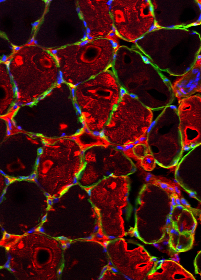Mouse models for human muscle diseases
The mouse is an ideal model system to investigate human diseases on a physiological and molecular level. Recent technological advances, like the human genome project, as well as the full sequence of the mouse genome made the design of tailored mouse mutants that lack a gene, or mimic a human mutation linked to a disease/disorder possible. Our goal is to investigate human diseases and disorders, like various types of cardiovascular diseases and skeletal muscle myopathies, using specific mouse models. We try to identify molecular pathways linked to the disease development, and ultimately develop cures.
Although several cell-culture and computer based alternatives to animal experiments exist to investigate fundamental biological questions, their usefulness in elucidating changes to embryonic and postnatal development and animal physiology remains extremely limited. Although a large part of biomedical basic research involves animal-free testing methods, some questions can only be answered with the help of animal research. We simply have no genuine alternative methods of testing what consequences the loss of a gene has on the whole organism. Mouse models also allow us to investigate the biological effects of rare mutations in proteins, without relying on humans affected by a particular congenital disease. In all procedures we strive to minimize stress and pain in the animals, not only because this would skew our research results, but because we care greatly about our animals and rely on their help to answer fundamental biological questions.
Animal Welfare
All our animals are housed in designated facilities under the constant care and observation of trained personnel and qualified veterinarians. We are fully accredited and comply with federal and state regulations and recommendations set forth by animal welfare organizations.
The US-San Diego policy on the use of animals states: "The University policy sets forth common procedures that assure the continued maintenance of high standards of animal care and use within the University.[...] The University, committed to maintaining high standards for the care and use of animals in research and teaching, therefore adopts as its own principles the National Institutes of Health (NIH) "Principles for Use of Animals."[...] The University, including its investigators and researchers, accepts responsibility for determining that research and teaching involving the use of animals fulfill these principles."
Click here for more informations on animal welfare and protection.
References
This article was assembled using the following source materials:

Support Basic Research
Support basic research into cardiac and skeletal muscle myopathies. Donate today!
Page 'Breadcrumb' Navigation:
